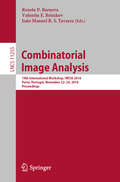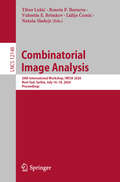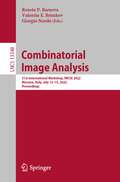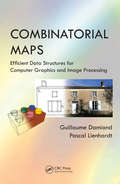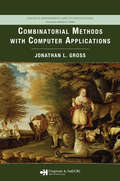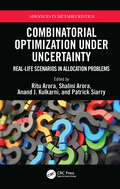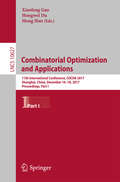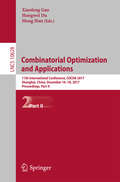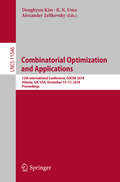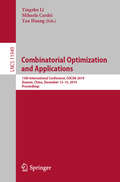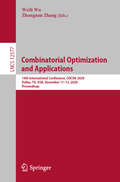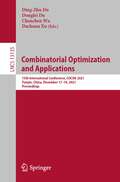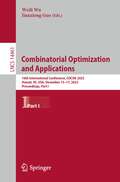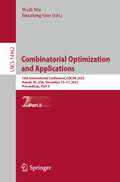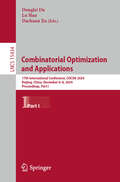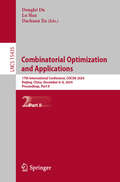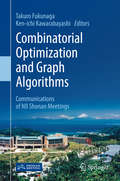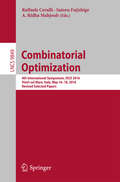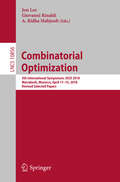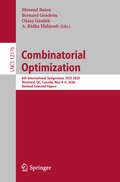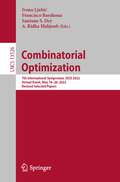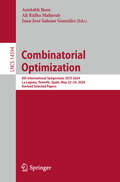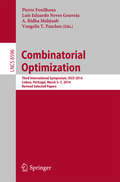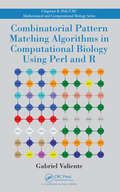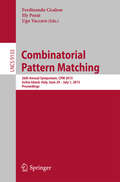- Table View
- List View
Combinatorial Image Analysis: 19th International Workshop, IWCIA 2018, Porto, Portugal, November 22–24, 2018, Proceedings (Lecture Notes in Computer Science #11255)
by Reneta P. Barneva Valentin E. Brimkov João Manuel TavaresThis book constitutes the refereed proceedings of the 19th International Workshop on Combinatorial Image Analysis, IWCIA 2018, held in Porto, Portugal, in November 2018.The 18 revised full papers presented were carefully reviewed and selected from 32 submissions. The papers are grouped into two sections. The first one includes nine papers devoted to theoretical foundations of combinatorial image analysis, including digital geometry and topology, array grammars, tilings and patterns, discrete geometry in non-rectangular grids, and other technical tools for image analysis. The second part includes nine papers presenting application-driven research on topics such as discrete tomography, image segmentation, texture analysis, and medical imaging.
Combinatorial Image Analysis: 20th International Workshop, IWCIA 2020, Novi Sad, Serbia, July 16–18, 2020, Proceedings (Lecture Notes in Computer Science #12148)
by Lidija Čomić Reneta P. Barneva Valentin E. Brimkov Nataša Sladoje Tibor LukićThis book constitutes the refereed proceedings of the 20th International Workshop on Combinatorial Image Analysis, IWCIA 2020, held in Novi Sad, Serbia, in July 2020. The 20 full papers presented were carefully reviewed and selected from 23 submissions. The papers are grouped into two sections. The first one includes twelve papers devoted to theoretical foundations of combinatorial image analysis, including digital geometry and topology, array grammars, picture languages, digital tomography, and other technical tools for image analysis. The second part includes eight papers presenting application-driven research on topics such as image repairing, annotation of images, image reconstruction, forgery detection, and dealing with noise in images.
Combinatorial Image Analysis: 21st International Workshop, IWCIA 2022, Messina, Italy, July 13–15, 2022, Proceedings (Lecture Notes in Computer Science #13348)
by Reneta P. Barneva Valentin E. Brimkov Giorgio NordoThis book constitutes the refereed proceedings of the 201st International Workshop on Combinatorial Image Analysis, IWCIA 2022, held in Messina, Italy, in July 2022.The 20 full papers presented were carefully reviewed and selected from 24 submissions. The papers are grouped into four sections. The first one consists of one invited talk. The second section contains seven papers devoted to digital geometry and topology. The third part consists of six papers discussing picture languages. The last part, including six papers, is devoted to various applications. We believe that many of these papers would be of interest to a broader audience, including researchers in scientific areas such as computer vision, shape modeling, pattern analysis and recognition, and computer graphics.
Combinatorial Maps: Efficient Data Structures for Computer Graphics and Image Processing
by Guillaume Damiand Pascal LienhardtA Versatile Framework for Handling Subdivided Geometric ObjectsCombinatorial Maps: Efficient Data Structures for Computer Graphics and Image Processing gathers important ideas related to combinatorial maps and explains how the maps are applied in geometric modeling and image processing. It focuses on two subclasses of combinatorial maps: n-Gmaps an
Combinatorial Methods with Computer Applications (Discrete Mathematics and Its Applications)
by Jonathan L. GrossThis combinatorics text provides in-depth coverage of recurrences, generating functions, partitions, and permutations, along with some of the most interesting graph and network topics, design constructions, and finite geometries. It presents the computer and software algorithms in pseudo-code and incorporates definitions, theorems, proofs, examples, and nearly 300 illustrations as pedagogical elements of the exposition. Numerous problems, solutions, and hints reinforce basic skills and assist with creative problem solving. The author also offers a website with extensive graph theory informational resources as well as a computational engine to help with calculations for some of the exercises.
Combinatorial Optimization Under Uncertainty: Real-Life Scenarios in Allocation Problems (Advances in Metaheuristics)
by Patrick Siarry Ritu Arora Prof. Shalini Arora Kulkarni, Dr. Anand J.This book discusses the basic ideas, underlying principles, mathematical formulations, analysis and applications of the different combinatorial problems under uncertainty and attempts to provide solutions for the same. Uncertainty influences the behaviour of the market to a great extent. Global pandemics and calamities are other factors which affect and augment unpredictability in the market. The intent of this book is to develop mathematical structures for different aspects of allocation problems depicting real life scenarios. The novel methods which are incorporated in practical scenarios under uncertain circumstances include the STAR heuristic approach, Matrix geometric method, Ranking function and Pythagorean fuzzy numbers, to name a few. Distinct problems which are considered in this book under uncertainty include scheduling, cyclic bottleneck assignment problem, bilevel transportation problem, multi-index transportation problem, retrial queuing, uncertain matrix games, optimal production evaluation of cotton in different soil and water conditions, the healthcare sector, intuitionistic fuzzy quadratic programming problem, and multi-objective optimization problem. This book may serve as a valuable reference for researchers working in the domain of optimization for solving combinatorial problems under uncertainty. The contributions of this book may further help to explore new avenues leading toward multidisciplinary research discussions.
Combinatorial Optimization and Applications: 11th International Conference, COCOA 2017, Shanghai, China, December 16-18, 2017, Proceedings, Part I (Lecture Notes in Computer Science #10627)
by Xiaofeng Gao, Hongwei Du and Meng HanThe two-volume set LNCS 10627 and 10628 constitutes the refereed proceedings of the 11th International Conference on Combinatorial Optimization and Applications, COCOA 2017, held in Shanghai, China, in December 2017. The 59 full papers and 19 short papers presented were carefully reviewed and selected from 145 submissions. The papers cover most aspects of theoretical computer science and combinatorics related to computing, including classic combinatorial optimization, geometric optimization, complexity and data structures, and graph theory. They are organized in topical sections on network, approximation algorithm and graph theory, combinatorial optimization, game theory, and applications.
Combinatorial Optimization and Applications: 11th International Conference, COCOA 2017, Shanghai, China, December 16-18, 2017, Proceedings, Part II (Lecture Notes in Computer Science #10628)
by Xiaofeng Gao, Hongwei Du and Meng HanThe two-volume set LNCS 10627 and 10628 constitutes the refereed proceedings of the 11th International Conference on Combinatorial Optimization and Applications, COCOA 2017, held in Shanghai, China, in December 2017. The 59 full papers and 19 short papers presented were carefully reviewed and selected from 145 submissions. The papers cover most aspects of theoretical computer science and combinatorics related to computing, including classic combinatorial optimization, geometric optimization, complexity and data structures, and graph theory. They are organized in topical sections on network, approximation algorithm and graph theory, combinatorial optimization, game theory, and applications.
Combinatorial Optimization and Applications: 12th International Conference, COCOA 2018, Atlanta, GA, USA, December 15-17, 2018, Proceedings (Lecture Notes in Computer Science #11346)
by Alexander Zelikovsky Donghyun Kim R. N. UmaThe conference proceeding LNCS 11346 constitutes the refereed proceedings of the 12th International Conference on Combinatorial Optimization and Applications, COCOA 2018, held in Atlanta, GA, USA, in December 2018. The 50 full papers presented were carefully reviewed and selected from 106 submissions. The papers cover most aspects of t graph algorithms, routing and network design problems, scheduling algorithms, network optimization, combinatorial algorithms, approximation algorithms, paths and connectivity problems and much more.
Combinatorial Optimization and Applications: 13th International Conference, COCOA 2019, Xiamen, China, December 13–15, 2019, Proceedings (Lecture Notes in Computer Science #11949)
by Yan Huang Yingshu Li Mihaela CardeiThis volume constitutes the proceedings of the 13th International Conference on Combinatorial Optimization and Applications, COCOA 2019, held in Xiamen, China, in December 2019. The 49 full papers presented in this volume were carefully reviewed and selected from 108 submissions. The papers cover the various topics, including cognitive radio networks, wireless sensor networks, cyber-physical systems, distributed and localized algorithm design and analysis, information and coding theory for wireless networks, localization, mobile cloud computing, topology control and coverage, security and privacy, underwater and underground networks, vehicular networks, information processing and data management, programmable service interfaces, energy-efficient algorithms, system and protocol design, operating system and middleware support, and experimental test-beds, models and case studies.
Combinatorial Optimization and Applications: 14th International Conference, COCOA 2020, Dallas, TX, USA, December 11–13, 2020, Proceedings (Lecture Notes in Computer Science #12577)
by Weili Wu Zhongnan ZhangThis volume constitutes the proceedings of the 14th International Conference on Combinatorial Optimization and Applications, COCOA 2020, held in Dallas, TX, USA, in December 2020. The 55 full papers presented in this volume were carefully reviewed and selected from 104 submissions. The papers are grouped into the following topics: Approximation Algorithms; Scheduling; Network Optimization; Complexity and Logic; Search, Facility and Graphs; Geometric Problem; Sensors, Vehicles and Graphs; and Graph Problems. Due to the Corona pandemic this event was held virtually.
Combinatorial Optimization and Applications: 15th International Conference, COCOA 2021, Tianjin, China, December 17–19, 2021, Proceedings (Lecture Notes in Computer Science #13135)
by Ding-Zhu Du Dachuan Xu Donglei Du Chenchen WuThis book constitutes the refereed proceedings of the 15th Annual International Conference on Combinatorial Optimization and Applications, COCOA 2021, which took place in Tianjin, China, during December 17-19, 2021.The 55 papers presented in this volume were carefully reviewed and selected from 122 submissions. They deal with combinatorial optimization and its applications in general, focusing on algorithms design, theoretical and experimental analysis, and applied research of general algorithmic interest.
Combinatorial Optimization and Applications: 17th International Conference, COCOA 2023, Hawaii, HI, USA, December 15–17, 2023, Proceedings, Part I (Lecture Notes in Computer Science #14461)
by Weili Wu Jianxiong GuoThe two-volume set LNCS 14461 and LNCS 14462 constitutes the refereed proceedings of the 17th International Conference on Combinatorial Optimization and Applications, COCOA 2023, held in Hawaii, HI, USA, during December 15–17, 2023. The 73 full papers included in the proceedings were carefully reviewed and selected from 117 submissions. They were organized in topical sections as follows: Part I: Optimization in graphs; scheduling; set-related optimization; applied optimization and algorithm; Graph planer and others;Part II: Modeling and algorithms; complexity and approximation; combinatorics and computing; optimization and algorithms; extreme graph and others; machine learning, blockchain and others.
Combinatorial Optimization and Applications: 17th International Conference, COCOA 2023, Hawaii, HI, USA, December 15–17, 2023, Proceedings, Part II (Lecture Notes in Computer Science #14462)
by Weili Wu Jianxiong GuoThe two-volume set LNCS 14461 and LNCS 14462 constitutes the refereed proceedings of the 17th International Conference on Combinatorial Optimization and Applications, COCOA 2023, held in Hawaii, HI, USA, during December 15–17, 2023. The 73 full papers included in the proceedings were carefully reviewed and selected from 117 submissions. They were organized in topical sections as follows: Part I: Optimization in graphs; scheduling; set-related optimization; applied optimization and algorithm; Graph planer and others;Part II: Modeling and algorithms; complexity and approximation; combinatorics and computing; optimization and algorithms; extreme graph and others; machine learning, blockchain and others.
Combinatorial Optimization and Applications: 17th International Conference, COCOA 2024, Beijing, China, December 6–8, 2024, Proceedings, Part I (Lecture Notes in Computer Science #15434)
by Dachuan Xu Donglei Du Lu HanThe two-volume set, LNCS 15434 and 15435, constitutes the refereed post-conference proceedings of the 17th International Conference on Combinatorial Optimization and Applications, COCOA 2024, held in Beijing, China, during December 6–8, 2024. The 53 full papers included in the proceedings were carefully reviewed and selected from 124 submissions. They deal with combinatorial optimization and its applications, including algorithm design, theoretical and experimental analysis, and applied research of general algorithmic interest.
Combinatorial Optimization and Applications: 17th International Conference, COCOA 2024, Beijing, China, December 6–8, 2024, Proceedings, Part II (Lecture Notes in Computer Science #15435)
by Dachuan Xu Donglei Du Lu HanThe two-volume set, LNCS 15434 and 15435, constitutes the refereed post-conference proceedings of the 17th International Conference on Combinatorial Optimization and Applications, COCOA 2024, held in Beijing, China, during December 6–8, 2024. The 53 full papers included in the proceedings were carefully reviewed and selected from 124 submissions. They deal with combinatorial optimization and its applications, including algorithm design, theoretical and experimental analysis, and applied research of general algorithmic interest.
Combinatorial Optimization and Graph Algorithms: Communications of NII Shonan Meetings
by Takuro Fukunaga Ken-Ichi KawarabayashiCovering network designs, discrete convex analysis, facility location and clustering problems, matching games, and parameterized complexity, this book discusses theoretical aspects of combinatorial optimization and graph algorithms. Contributions are by renowned researchers who attended NII Shonan meetings on this essential topic. The collection contained here provides readers with the outcome of the authors' research and productive meetings on this dynamic area, ranging from computer science and mathematics to operations research. Networks are ubiquitous in today's world: the Web, online social networks, and search-and-query click logs can lead to a graph that consists of vertices and edges. Such networks are growing so fast that it is essential to design algorithms to work for these large networks. Graph algorithms comprise an area in computer science that works to design efficient algorithms for networks. Here one can work on theoretical or practical problems where implementation of an algorithm for large networks is needed. In two of the chapters, recent results in graph matching games and fixed parameter tractability are surveyed. Combinatorial optimization is an intersection of operations research and mathematics, especially discrete mathematics, which deals with new questions and new problems, attempting to find an optimum object from a finite set of objects. Most problems in combinatorial optimization are not tractable (i. e. , NP-hard). Therefore it is necessary to design an approximation algorithm for them. To tackle these problems requires the development and combination of ideas and techniques from diverse mathematical areas including complexity theory, algorithm theory, and matroids as well as graph theory, combinatorics, convex and nonlinear optimization, and discrete and convex geometry. Overall, the book presents recent progress in facility location, network design, and discrete convex analysis.
Combinatorial Optimization: 4th International Symposium, ISCO 2016, Vietri sul Mare, Italy, May 16-18, 2016, Revised Selected Papers (Lecture Notes in Computer Science #9849)
by A. Ridha Mahjoub Raffaele Cerulli Satoru FujishigeThis book constitutes the thoroughly refereed post-conference proceedings of the Second International Symposium on Combinatorial Optimization, ISCO 2012, held in Athens, Greece, in April 2012. The 37 revised full papers presented together with 4 invited talks were carefully reviewed and selected from 94 regular and 30 short submissions. They present original research on all aspects of combinatorial optimization, ranging from mathematical foundations and theory of algorithms to computational studies and practical applications.
Combinatorial Optimization: 5th International Symposium, ISCO 2018, Marrakesh, Morocco, April 11–13, 2018, Revised Selected Papers (Lecture Notes in Computer Science #10856)
by A. Ridha Mahjoub Giovanni Rinaldi Jon LeeThis book constitutes the thoroughly refereed post-conference proceedings of the 5th International Symposium on Combinatorial Optimization, ISCO 2017, held in Marrakesh, Marocco, in April 2018. The 35 revised full papers presented in this book were carefully reviewed and selected from 75 submissions. The symposium aims to bring together researchers from all the communities related to combinatorial optimization, including algorithms and complexity, mathematical programming and operations research.
Combinatorial Optimization: 6th International Symposium, ISCO 2020, Montreal, QC, Canada, May 4–6, 2020, Revised Selected Papers (Lecture Notes in Computer Science #12176)
by A. Ridha Mahjoub Mourad Baïou Bernard Gendron Oktay GünlükThis book constitutes the thoroughly refereed post-conference proceedings of the 6th International Symposium on Combinatorial Optimization, ISCO 2020, which was due to be held in Montreal, Canada, in May 2020. The conference was held virtually due to the COVID-19 pandemic.The 24 revised full papers presented in this book were carefully reviewed and selected from 66 submissions.They were organized in the following topical sections: polyhedral combinatorics; integer programming; scheduling; matching; Network Design; Heuristics.
Combinatorial Optimization: 7th International Symposium, ISCO 2022, Virtual Event, May 18–20, 2022, Revised Selected Papers (Lecture Notes in Computer Science #13526)
by A. Ridha Mahjoub Ivana Ljubić Francisco Barahona Santanu S. DeyThis book constitutes thoroughly refereed and revised selected papers from the 7th International Symposium on Combinatorial Optimization, ISCO 2022, which was held online during May 18–20, 2022.The 24 full papers included in this book were carefully reviewed and selected from 50 submissions. They were organized in topical sections as follows: Polyhedra and algorithms; polyhedra and combinatorics; non-linear optimization; game theory; graphs and trees; cutting and packing; applications; and approximation algorithms.
Combinatorial Optimization: 8th International Symposium, ISCO 2024, La Laguna, Tenerife, Spain, May 22–24, 2024, Revised Selected Papers (Lecture Notes in Computer Science #14594)
by Amitabh Basu Ali Ridha Mahjoub Juan José Salazar GonzálezThis book constitutes the refereed proceedings of the 8th International Symposium on Combinatorial Optimization, ISCO 2024, held in La Laguna, Tenerife, Spain, during May 22–24, 2024. The 30 full papers included in this book were carefully reviewed and selected from 46 submissions. They were organized in topical sections as follows: integer programming; graph theory; parameterized algorithms; approximation algorithms; integer programming for machine learning; and applications.
Combinatorial Optimization: Third International Symposium, ISCO 2014, Lisbon, Portugal, March 5-7, 2014, Revised Selected Papers (Lecture Notes in Computer Science #8596)
by Pierre Fouilhoux, Luis Eduardo Neves Gouveia, A. Ridha Mahjoub and Vangelis T. PaschosThis book constitutes the thoroughly refereed post-conference proceedings of the Third International Symposium on Combinatorial Optimization, ISCO 2014, held in Lisbon, Portugal, in March 2014. The 37 revised full papers presented together with 64 short papers were carefully reviewed and selected from 97 submissions. They present original research on all aspects of combinatorial optimization, such as algorithms and complexity; mathematical programming; operations research; stochastic optimization; graphs and combinatorics.
Combinatorial Pattern Matching Algorithms in Computational Biology Using Perl and R (Chapman & Hall/CRC Computational Biology Series)
by Gabriel ValienteEmphasizing the search for patterns within and between biological sequences, trees, and graphs, Combinatorial Pattern Matching Algorithms in Computational Biology Using Perl and R shows how combinatorial pattern matching algorithms can solve computational biology problems that arise in the analysis of genomic, transcriptomic, proteomic, metabolomic
Combinatorial Pattern Matching: 26th Annual Symposium, CPM 2015, Ischia Island, Italy, June 29 -- July 1, 2015, Proceedings (Lecture Notes in Computer Science #9133)
by Ferdinando Cicalese Ely Porat Ugo VaccaroThis book constitutes the refereed proceedings of the 26th Annual Symposium on Combinatorial Pattern Matching, CPM 2015, held on Ischia Island, Italy, in June/July 2015. The 34 revised full papers presented together with 3 invited talks were carefully reviewed and selected from 83 submissions. The papers address issues of searching and matching strings and more complicated patterns such as trees; regular expressions; graphs; point sets; and arrays. The goal is to derive combinatorial properties of such structures and to exploit these properties in order to achieve superior performance for the corresponding computational problems. The meeting also deals with problems in computational biology; data compression and data mining; coding; information retrieval; natural language processing; and pattern recognition.
